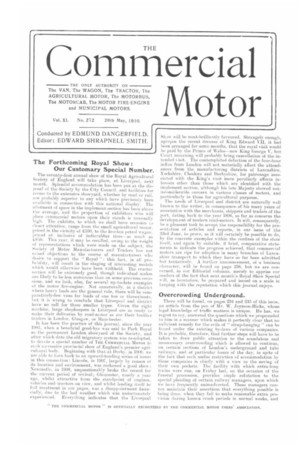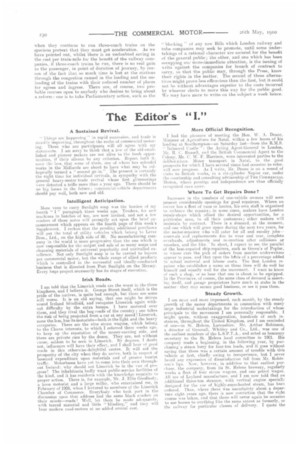Overcrowding Underground.
Page 1

Page 2

If you've noticed an error in this article please click here to report it so we can fix it.
There will be found, on pages 234 and 235 of this issue, an article from the pen of Mr. W. Jnynson-Hicks, whose legal knowledge of traffic matters is unique. lie has, we regret to say, answered the questions which we propounded to him in a manner whit+ makes it perfectly clear that no sufficient remedy for the evils of " strap-hanging " can be found under the existing by-laws of various companies. It is probable, therefore, that further steps will have to be taken to draw public attention to the scandalous and unnecessary overcrowding which is allowed to continue, on certain sections of London's underground and tube re il ways, and at particular hours of the day, in spite of the fact that such undue restriction of accommodation by those companies is chiefly with a view to the saving of their own pockets. The facility with which extra-long trains were run, on Friday last, on the occasion of the funeral procession, provides ample refutation to the special pleading of certain railway managers, upon which we have frequently animadverted, These managers cannot mnintain their assertions that everything possible is being done, when they fail to make reasonable extra provision during known crush periods in normal weeks, and
when they continue to run three-coach trains on the specious pretext that they must get acceleration. As we have pointed out whilst there is an undoubted saving in the cost per train-mile for the benefit of the railway companies, if three-coach trains be run, there is no real gain to the passenger, in point of duration of journey, by reason of the fact that so much time is lost at the stations through the congestion caused in the loading and the unloading of the trains with their reduced number of places for egress and ingress. There are, of course, two probable courses open to anybody who desires to bring about a reform : one is to take Parliamentary action, such as the " blocking of any new Bills which London railway and tube companies may seek to promote, until some undertakings of a rational character are secured for the benefit of the general public ; the other, and one which has been occupying our more-immediate attention, is the issuing of writs against the companies for breach of contract to carry, so that the public may, through the Press, know their rights in the matter. The second of these alternatives might prove less efficacious than the first, but it could, 'lot be without advantages superior to the costs incurred by whoever elects to move this way for the public good. We may have more to write on the subject a week hence.




















